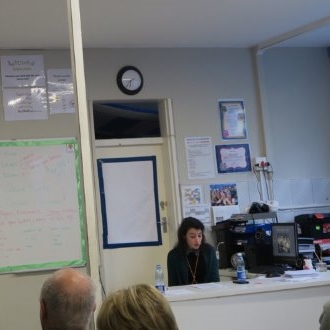click to dowload our latest edition
CLICK HERE TO SUBSCRIBE TO OUR NEWSLETTER


Published
6 years agoon
By
adminTALI FEINBERG
This surprising piece of history demonstrates that the dominant “Litvak” influence in our community was not always set in stone, and that we have not always been as homogenous as we thought.
A PhD student in the History Department at New York University, and a Research Associate at the Society, Work and Development Institute at the University of the Witwatersrand, Phillips’ presentation focused on the tension between groups within the South African Jewish community in the early 20th century. Her research has uncovered a culture and history of dissent and disagreement in the community that has, in many ways, “been written out of the narrative”.
When Lithuanian Jews began arriving in the country, the mostly Anglo-German community were embarrassed by these “Yiddish arrivals”. The aforementioned petition was just one such example. The groups practiced their Judaism differently, and there were a number of breakaway and splinter groups as the community adjusted its identity.
Politically, Jewish immigrants to South Africa were influenced by two factors: the rise of the socialist and secular Bund movement, and the anti-Tzarist sentiment emerging from Russia. This led to the formation of a number of organisations that often went against the grain of the mainstream Jewish community.
For example, the Jewish Worker’s Club, formed in 1929, was a cultural, political, and Yiddish home for Jewish artisans and labourers, who believed that the solution to anti-Semitism was not nationalism and Zionism, but socialism. They perceived Zionism as “the response of the bourgeoisie”, and that their fight should be against capitalism, as no one could be free under exploitation and oppression.
Essentially, they believed that if Jews faced problems, they could be solved in the country where they lived, and they did not want to see Jews ruling over Arabs. Finally, they thought Hebrew was part of the middle class, and preferred to speak Yiddish.
Much of this tension came to a head with the bombing of the King David Hotel in Israel in 1946. Phillips has been told that “there were fist fights in the Gardens Shul”, as the community decided how to react.
Another organisation called Gezerd – an acronym of Yiddish words – aimed to support Jews in the Soviet Union, where they believed Jews should remain. They supported the proposal of Birobidjan, a “Jewish territory” that Stalin had designated in the Far East. In their minds, they did not believe Jews needed to leave Russia, but should be accepted and absorbed.
While these ideas may seem strange or naive, Phillips’ research shows that the South African Jewish community has grappled with Zionism in the past. Furthermore, she shows that the people who belonged to these organisations were not excluded from the community, even if they did not support the creation of a Jewish State, and that choosing to be a Zionist was very much part of the mainstream debate in the community.
“It shows that it is wrong to silence and censor in a community that has long been vibrant and diverse. Those trying to create a monolithic community are forcing something that neither my ancestors – nor yours – would recognise,” she said.
Ironically, her own brother, Jeremy Phillips, was disinvited from Limmud due to his affiliation with anti-Zionist organisations. Because he was supposed to present the session with his sister, she addressed it in her discussion.
“Jeremy is a proud Jew, probably one of the few who has been going to shul religiously since his Barmitzvah,” Phillips said, commenting that she was deeply distressed about his exclusion, and had considered pulling out of Limmud in protest.
However, she decided to go because she valued the organisation, and because she was excited to present her research. She warned, however, that “a community that cannot make space for debate, and turns on its own, is at risk of splitting or even collapsing”.
The siblings’ father, Emeritus Professor Howard Phillips, recently wrote a book on the history of the South African Jewish community, and has recorded much of the history of the Cape Town Hebrew Congregation. His own grandfather, Joe Phillips, was one of the immigrants from Lithuania that Laura Phillips describes, and was a member of the Gardens Shul. The Phillips family are still members of this shul. Yet three generations later, his great, great grandson Jeremy is being excluded from the mainstream community.
Laura’s distress was echoed around the room. Many individuals in the large crowd expressed their dismay and disappointment that her brother and others had been “censored and silenced”. Some expressed concern that such decisions would make young people fearful of antagonising the community, and so turn away from it. Many expressed the hope that the community would be brave enough to grapple with debate and difference in future – as it has done in the past.
